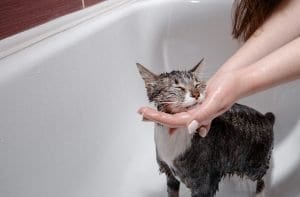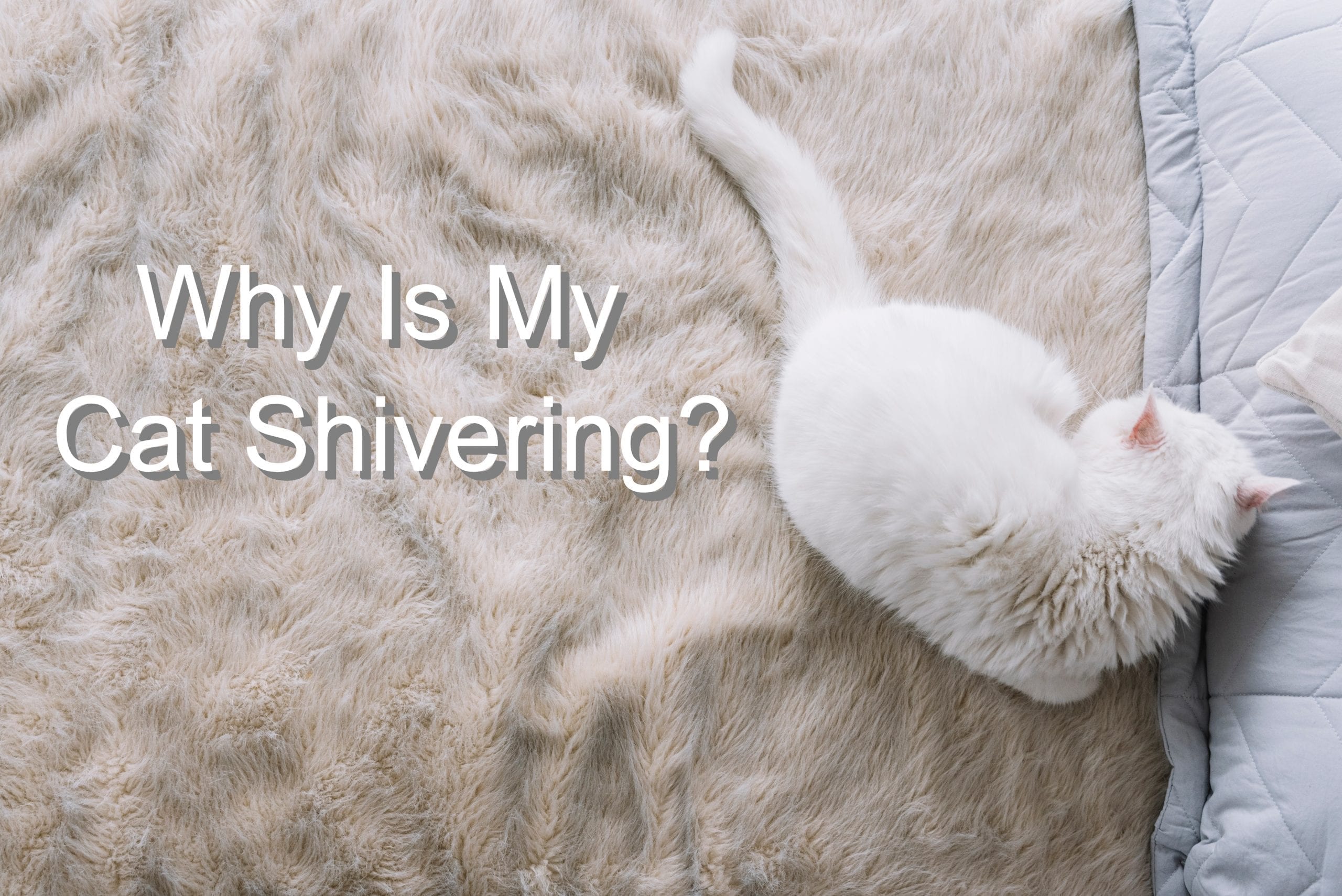If you are a cat parent, you tend to worry a lot about your cat, and any symptoms it might be showing. One of the symptoms you might have noticed is your cat’s shivering. It can be local shivers, in one part of the cat’s body, or it can be all over its body, either way, you feel it there the second you put your hand on its skin, or it climbs up next to you and decides to use your body like a sleeping cushion.
Sometimes you would feel it when petting your cat while it purrs, and other times, you notice it from a distance. If it is wintertime, you might relate your cat’s trembling to the cold weather, after all, that low temperature makes us all shake. However, if your cat is shaking too often, or trembling even when it is a hot summer day, you should start considering other factors. What could be the reasons that make your cat shiver? And what can you do to help it?
NOTE: We want to inform our blog readers that before we publish any article, the team “Proudcatowners” does deep research based on experience and knowledge about cats and everything related to them, to guarantees reliable and precise information, satisfy the readers is our first priority.
My cat keeps shaking its head, is that normal?
If your cat keeps trembling its head only, and reaching out to its ear to scratch it, it is usually a sign of an ear problem. Your veterinarian would be able to determine the exact issue.
Why is my cat shivering while sleeping?
Our little paw friends are known for being notorious nappers, and they spend a lot of time taking a nap, either on your lap, on your pillow, or in another comfy spot in your house. You might notice your cat shivering when it is going to sleep, or while sleeping, this is usually due to signals being sent out to the cat’s brain in the dreaming phase.
Cats are like humans, they also go through the REM phase, when they are about to sleep. Cats are very likely to dream during this period. You would notice squeaking and twitching, either in one part of the body or more. When doing this, they are getting rid of muscle tone, which is known as atonia.
Why is my cat shivering while purring?
If your cat is trembling while purring, it is likely that because they are purring strong enough for their body to vibrate, and many owners notice their cat’s tail vibrating. It is known that when cats purr to a certain degree, their body ends up shivering. If you did not notice any sign of abnormal symptoms that might require medical need, our cat is just purring strong enough.
Why is my cat shivering after a bath?

If you just finished bathing your cat, and they are shivering, it is probably because their body temperature dropped. If the water was too cold, or the environment you are in has low heat, your cat might be feeling very cold, especially that it has a wet fur. If it is not taken care of properly, it can become hypothermia. You should quickly dry your cat’s fur, and try to warm its body. Wrap it in a towel or a warm blanket.
Be careful when you are bathing your cat, make sure you use cat shampoo, and in case you ran out, make sure whichever other products you will use are safe for cats.
Why is my cat shivering and lethargic?
If your cat is experiencing a sign of lethargy, it can be an emergency. Your cat is suffering from one of the following:
- Stress
- Kidney disease
- toxins
- hypothermia
- hyperthermia
- hypoglycemia
- heart problems
What should I do?
If you notice any of these symptoms in your cat, you should take it immediately to a veterinarian. These are dangerous illnesses, and can turn extremely severe if not treated properly, and as soon as possible.
Should I worry?
Lethargy in cats is never a good sign, so if you notice your cat having it, rush it to a veterinarian, worrying about your cat’s health is what any pet parent would do. However, make sure your worrying does not turn into panicking, and it does not get in the way of taking care of your cat in those kinds of situations.
In cases of shivering while purring or while sleeping, you should not worry, unless your cat displays other suspicious symptoms. And if you are concerned, you should see a veterinarian, just in case.
Should I go to the vet right away?
In cases of lethargy, yes, you must rush your cat to a vet. The sooner you get there, the earlier the symptoms are treated and controlled before they get more severe.
Once you take your cat to the veterinarian, he or she will run a full examination on it, as well as check your cat’s medical history. The usual medical examination includes:
- Total and complete blood count
- Urinalysis
- Biochemistry profile
- Electrolyte panel
- In the case of brain disease, for example, these tests will come out negative, other tests will be run on the cat: X-rays, CT- scan…
This would help the vet diagnose the exact disease that your cat has and discover any underlying symptoms. The tests which he would run on your cat would generally depend on the symptoms your cat is displaying; therefore, the sooner you book an appointment, the better it is for your cat.
Other possible causes of shivering
Your cat’s constant trembling can be due to many reasons, and some are less dangerous than others. It can vary from fear to feeling cold. But in whichever case, if you notice any of these symptoms in your cat, you should not ignore it, and you should set an appointment with the veterinarian as soon as possible.
Pain
Our feline friends can be fragile sometimes, and they might end up hurting themselves one way or the other. Playing outside, getting caught in a fight with another cat or another animal, having an injury inside the house, or being sick. If your cat is trembling, they are showing you a sign of what’s hurting them. If you notice a physical injury, it could be the cause of pain. Other times, your cat might be shivering due to suffering from an internal cause. If you notice your little friend shivering, outside the normal state, it is best to check with your veterinarian.
Kidney disease or kidney failure
Your cat might be shivering as a desperate call for help. If the cat is suffering from kidney disease or kidney failure, it would be showing these symptoms in addition to shaking:
- Frequent urinating
- Drinking large quantities of water
- Loss of appetite
- Remarkable loss of weight
- Vomiting
- Mouth ulcers
- Bad breath (a smell similar to ammonia)
- Change in the color of the cat’s tongue (it turns brownish)
- Diarrhea or constipation instead
- Unclear urine (cloudy)
- Weakness
- Dry coat
Hypoglycemia
Also known as “low blood sugar”, which means the deficiency of glucose levels in your cat’s body. This mostly occurs with cats that are 3 months old or younger, because they still haven’t learned to control and regulate their blood sugar levels.
Sugar is one of the primary energy sources for cats, so if your cat is deprived of that, or it is not getting enough sugar, its energy levels decline with the decline of sugar levels in its blood. There are cases when the cat ends up being unconscious because of that, and in the most severe cases, it can even result in death.
Hypoglycemia is not exactly a disease, but instead a symptom of another un-diagnosed or unnoticed disease.
Possible causes
- Poor nutrition
- An environment of low temperature
- Intestinal parasites
- Fasting in addition to exercise or too much physical action
How to know if my cat is suffering from hypoglycemia?
If your cat displays one, or some of the symptoms mentioned below, or notice any slight change in behavior, it is best to take it to a veterinarian for a quick check-up.
Symptoms
- Trembling
- Muscle twitching or shaking
- Blindness in some cases
- Loss of appetite
- Decreased level of coordination
- Severe lethargy
- Strange or unusual behavior
- Unconsciousness
- Extreme fatigue
What can I do to prevent it?
Providing your kitten with a healthy balanced diet, as well as proper and rich nutrition regularly, especially at this age, can help protect your cat, keep its blood sugar levels balanced, and prevent hyperglycemia. However, sometimes you cannot protect your cat entirely from getting sick; and these cases might occur more often than not.
You can follow specific steps to make sure your cat stays as healthy as possible. Keeping a good eye on your little paw friend and trying to notice any change in behavior or any sign of weird symptoms would guide you in getting the help you need from your veterinarian, or an animal hospital, as soon as possible. Booking an appointment with a veterinarian now and then for a regular check-up could prevent it as well, and would help treat it faster if it discovered early.
Hyperthermia
Which is also known as high temperature. This occurs when your cat can no longer regulate its body temperature and keep it at a normal level; they end up having an elevated temperature.
Is hyperthermia the same as fever?
These two can seem similar and can be very difficult to tell apart. However, fever is when the body raises its temperature as immune system response. Sometimes it does so in an attempt to fight an infection or as a reaction to inflammation. On the other hand, hyperthermia is when the body temperature rises due to a failure in thermoregulation. Therefore, the cat’s body produces or absorbs too much heat, which is also referred to as overheating.
Causes of hyperthermia
- Exercise
- Being exposed to extreme heat
- Staying in an excessively hot environment
- Reaction to drugs, medications, or poisons
- Symptoms:
- Restlessness
- Trembling
- Panting
- Lethargy
- Vomiting
- Sweaty paws
- Purple or red gums
What should I do if it happens to my cat?
Hyperthermia is a very serious illness for cats, so if your cat shows any symptoms of high body temperature, you should rush it to the nearest veterinarian available. If you do not have immediate access to one, here are some tips to follow:
- Soak your cat’s body in cold water (not too cold or freezing though)
- Provide it with easy access to water
- Carry your cat to a cooler spot
Hypothermia
Hypothermia is the opposite of hyperthermia. It is when the cat’s body temperature drops lower than average. This decline in body temperature leads to the decline of the temperature of other organs, thus, slowing down, and if aggravated, the organs can even stop functioning.
Causes
- Exposure to very low temperatures, especially when the cat is wet
- Staying in cold environments for extended periods
- Shock
- Infection
- Exposure to cold water for a long period
Symptoms
- Shivering violently
- The cat’s ears and feet would get extremely cold
- In extremely cold cases, you will notice the appearance of frostbites
- Increased lethargy
- Fainting or coma in extreme cases
What should I do?
In these cases, you should take your cat to the veterinarian immediately. But if you do not have immediate access to one, here is what you can do at home:
- If your cat is wet, dry it immediately
- Move the cat to a warmer environment
- Wrap it in a warm blanket or towel
- Avoid using electronic heating methods, like heating pads, for example, because you might end up burning your cat’s skin.
Toxicity
Intoxication is not an uncommon thing with the feline species. Being the curious creatures they are, they often get face to face with toxic materials and end up consuming them. Some cats show symptoms earlier than others, and they might react differently to it. Your cat can be poised due to the following:
- Consuming a toxic material
- Digesting an intoxicated/poisoned prey
- Swallowing certain toxic substances when grooming their fur or cleaning themselves
- Absorbing some toxins by accident from their skins (especially their paws)
- Inhaling a toxic substance
Signs of toxicity in your cat
- Vomiting
- Trembling
- Diarrhea
- Difficulty in breathing
- Coughing
- Sneezing
- Loss of appetite
- And consequently, loss of weight
- Inflammation
- Swelling in certain parts of the body
- Seizures
- Comas
What should I do if I suspect that my cat has been poisoned?
- It would help if you immediately moved your cat from the place in which he was exposed to those toxic materials.
- Try to prevent your cat from licking itself if their fur was the source of poison.
- Bathe your cat with shampoo to get rid of toxins on the skins
- Do not try to make the cat vomit that could be harmful to it.
- Call your veterinarian and set an appointment as soon as possible.
Stress

When cats are faced with a particular danger, for example, like meeting the neighbor’s car, the one it always fights with. Their adrenaline levels, as well as blood sugar levels, are elevated to handle the situation. The cat’s glands release a more substantial amount of hormones that contribute to all of that and make the heartbeat race faster as well.
Causes
Several reasons can motivate stress. These reasons vary depending on the cat and the situation, but here are some of the causes that might make your cat stressed out:
- Territory anxiety
- Nutritional problems
- Having their claws trimmed
- Boredom
- Issues with other animals at home or close surrounding neighbors
- Loud and surprising noise: fireworks, gunshots, firework, or others.
- Car rides
- Being left home alone
- Just like humans, cats can also be afraid of their doctor, so. A veterinarian appointment can also be stressful for the cat
- Going to or being around a party (especially if your cat is not familiar with the spot or people)
- Adopting a new addition to the pet family
- Someone unfamiliar with family members you don’t know yet
If your cat stays under this state of stress for too long, it can result in physical illnesses, such as the following:
- Urinary tract infection
- Skin conditions
- Allergies
- Cancer
What can I do to help relieve my cat’s stress?
If you can remove the item that is causing your cat to be stressed, that would help it. However, if you are not able to do so, try to come up with other techniques to comfort your cat. A veterinarian appointment would give you a better insight on how to solve that issue.
Trauma
Your cat can be exposed to trauma because of an injury, a shock, or due to the cat’s environment somehow. If your cat is suffering from trauma, you will notice shivering in it as well. Most times, traumas are not very easy to notice, so you should focus on details when it comes to your cat’s behavior, and visit a veterinarian if you see anything suspicious.
Injury

An injury can be either physically showing, or an internal one. If your cat has symptoms of illness, a swollen body part, or you can see the injury clearly, you should rush him to the veterinarian to get it treated. If you ignore it or postpone the pet doctor appointment for too long, that physical injury can turn to something more severe such as inflammation and infection.
The most apparent sign you would notice in case of injury is trembling, either the entire cat body or only the injured body part. Your cat would also feel week, have a change in behavior, and react abnormally, especially if you touch the injured area. An injury can eventually result in trauma as well.
Nervous system disease
Also known as a neurological disorder, and it happens when your cat has a problem within its nervous system.
Symptoms
- Trembling
- Seizures
- Paralysis in either one or more legs
- Lack of coordination
- Pain
- Numbness
Should I be worried?
If your cat displays any of the symptoms mentioned above, make sure you stay calm and take care of your cat. If you panic, you might miss noticing certain things that could be helpful and informative for the veterinarian. Take the measurements needed before you take your cat to the hospital, and make sure you always set an appointment with your veterinarian to run a full examination on your cat. Do not ignore what your cat is trying to tell you, because that would lead to severe sicknesses and severe health consequences.
Conclusion
Cats might be carnivores, but they can also be very fragile. Any change in room temperature, exposure to cold water, or a change in environment, can have negative consequences on your cats. In such cases, we will notice shivering, among other symptoms. Therefore, we should make sure to keep our cats warm in winter, keep them in a cool place in summer, and provide them with lots of water. Cats might display symptoms of illness, which should not be overlooked or ignored. An appointment with a veterinarian is necessary if you want your cat to stay safe and healthy.
Another thing we might notice is our cats trembling while sleeping, or while purring, which are entirely reasonable, unless accompanied with other symptoms that were mentioned. Lethargy is never a good sign, and if your cat ever shows any symptoms of it, you should rush it to the veterinarian as soon as possible. Cats which are 3 months old or younger have a higher rate of developing hypoglycemia, which is why we must focus on providing proper, healthy, and balanced nutrition until they can regulate their blood sugar levels better on their own.




